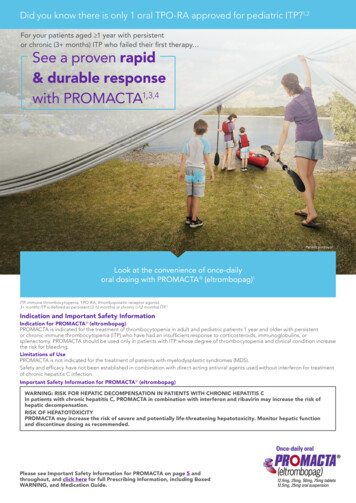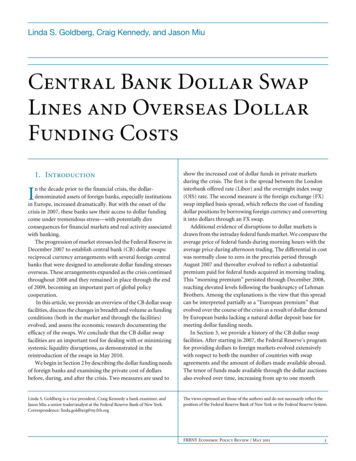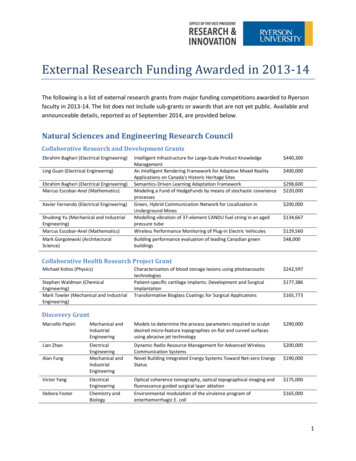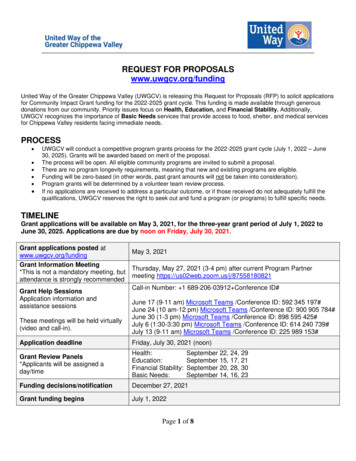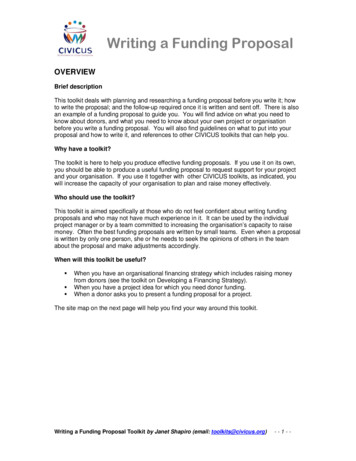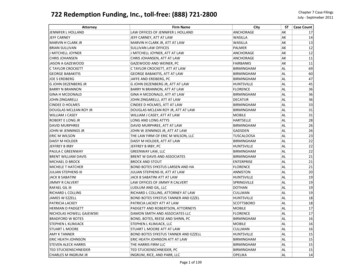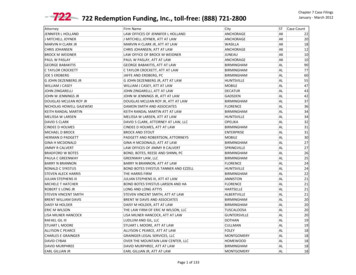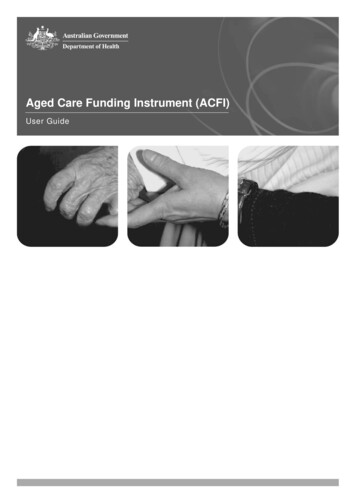
Transcription
Aged Care Funding Instrument (ACFI)User Guide1
ContentsIntroduction . 3The ACFI as a calculator of the residential aged care subsidy . 4Definitions and acronyms . 4The ACFI process . 8Documentation Requirements . 10Diagnosis questions . 10Mental and Behavioural Diagnosis . 15Medical Diagnosis . 17Activities of Daily Living (ADL) Domain . 19ACFI 1 Nutrition . 20ACFI 2 Mobility . 21ACFI 3 Personal Hygiene . 22ACFI 4 Toileting . 23ACFI 5 Continence . 24Behaviour Domain . 26ACFI 6 Cognitive Skills . 27ACFI 7 Wandering . 29ACFI 8 Verbal Behaviour . 30ACFI 9 Physical Behaviour . 32ACFI 10 Depression . 34Complex Health Care Domain . 36ACFI 11 Medication . 36ACFI 12 Complex Health Care . 38Appendix 1: ACAP code list for health condition–long . 43Appendix 2–Description of behavioural symptoms . 47Appendix 3–Interaction of the Aged Care Funding Instrument and the funding model . 48ISBN: 978-1-76007-306-0Publications approval number 11738Publication Date: 9 December 2016Copyright 2016 Commonwealth of Australia as represented by the Department of HealthThis work is copyright. You may copy, print, download, display and reproduce the whole or part of thiswork in unaltered form for your own personal use or, if you are part of an organisation, for internal usewithin your organisation, but only if you or your organisation:(a)(b)do not use the copy or reproduction for any commercial purpose; andretain this copyright notice and all disclaimer notices as part of that copy or reproduction.Apart from rights as permitted by the Copyright Act 1968 (Cth) or allowed by this copyright notice, allother rights are reserved, including (but not limited to) all commercial rights. Requests and inquiriesconcerning reproduction and other rights to use are to be sent to the Communication Branch,Department of Health, GPO Box 9848, Canberra ACT 2601, or via e-mail toCorporateComms@health.gov.au.2
IntroductionThe Aged Care Funding Instrument (ACFI) is a resource allocation instrument. It focuses on the mainareas that discriminate core care needs among care recipients. The ACFI assesses core care needsas a basis for allocating funding.The ACFI focuses on care needs related to day to day, high frequency need for care. These aspectsare appropriate for measuring the average cost of care in longer stay environments.While based on the differential resource requirements of individual persons, the ACFI is primarilyintended to deliver funding to the financial entity providing the care environment. This entity for mostpractical purposes is the residential aged care service. When completed on all care recipients in theservice the ACFI provides sufficient precision to determine the overall relative care needs profile andthe subsequent funding.The ACFI consists of 12 questions about assessed care needs, and two diagnostic sections.While the ACFI questions provide basic information that is related to fundamental care need areas, itis not a comprehensive assessment package. Comprehensive assessment considers a broader rangeof care needs than is required in the ACFI.Comprehensive assessment is used for the purposes of ensuring care recipients receive quality andsafe care that appropriately meets their care needs. Approved providers responsibilities in this regardare set out in the Aged Care Act 1997. In particular the User Rights Principles 1997 and the Quality ofCare Principles 2014.This ACFI User Guide applies to ACFI appraisals or reappraisals with a date of effect on or after1 January 2017.Earlier appraisals relate to previous versions of the ACFI User Guide, see table below.Publication DateApplicable to ACFI Appraisal dates29 February 200820 March 2008 to 31 December 200915 December 20091 January 2010 to 31 January 20137 January 20131 February 2013 to 30 June 20131 May 20131 July 2013 to 31 December 20163
The ACFI as a calculator of theresidential aged care subsidyThree domains of residential care are subsidised by the ACFI: Activities of Daily Living Domain (ACFI Questions 1-5; Nutrition, Mobility, PersonalHygiene, Toileting and Continence) Ratings calculated from completing checklists in thisdomain determines the level of the subsidy.Behaviour Domain (ACFI Questions 6-10; Cognitive Skills, Wandering, Verbal Behaviour,Physical Behaviour and Depression). Ratings calculated from completing checklists in thisdomain determines the level of the subsidy.Complex Health Care Domain (ACFI Questions 11-12; Medication and Complex Health CareProcedures) Ratings calculated from completing checklists in this domain determines the levelof the subsidy.The amount payable in respect of a particular care recipient depends on the ratings (A, B, C or Dwhere relevant) determined for each of the ACFI questions (1–12) as well as the supportingdocumentation provided in the Answer Appraisal Pack against each of the ratings. Diagnoses are alsorequired to be contained in the ACFI Answer Appraisal Pack and are used to support the claim forsubsidy.Appendix 3 sets out the relationship between the ACFI questions and the three domains, and providesthe question scores and category thresholds.Definitions and acronymsACAPThe ACAP (Aged Care Assessment Program) is an important part of Australia’s aged care system.The Commonwealth engages each state and territory government to manage the day-to-dayoperations of the ACAP and Aged Care Assessment Teams (ACATs or in Victoria referred to as theAged Care Assessment Services). The focus of the ACAT’s is to comprehensively assess the careneeds of frail older people to determine eligibility for care types under the Aged Care Act 1997.ACCRThe ACCR (Aged Care Client Record) prior to the introduction of the NSAF was completed by anAged Care Assessment Team or Service. A copy of the ACCR content can be filed in the ACFIAnswer Appraisal Pack if relevant and provides evidence to substantiate an ACFI claim made in thepack.ActivitiesActivities are the actions required to meet a care recipients care needs. Activities must be informed byan assessment and only the specified activities in a nominated ACFI question can be taken intoaccount in the ACFI appraisal. Also refer page 19, Activities of Daily Living Domain, for furtherinformation.Answer Appraisal PackThis refers to an ACFI Answer Appraisal Pack and is the completed record of the care recipient’sACFI appraisal or reappraisal. The pack must include all relevant documentation required tosubstantiate the claim for ACFI subsidy.The documentation must be in the form specified in this guide and relates to the time of theappraisal/reappraisal. Refer page 13 ‘Table1: ACFI at a glance’ for evidence requirements.4
Under section 7 of the Records Principles 2014, it is the responsibility of approved providers to ensuretheir Answer Appraisal Pack is up to date, complete, and available when ACFI reviews are undertakenby the Department of Health to validate the ACFI classification.AssessmentAssessments are required to evidence the completed checklists for ACFI. The Assessment Packprescribes some tools to be used in completing an ACFI. For questions that do not have a prescribedassessment tool the appraiser can use a validated evidence based tool of their choice. A list ofsuggested tools have been provided at for-aged-care-funding-instrument-acfiAn Assessment provided as evidence for an ACFI checklist would be completed by a person who isappropriately qualified to undertake the assessment. It must be evidence based and identify the UsualCare Needs and dependencies of the care recipient at the time of the appraisal.To be included as evidence in the Answer Appraisal Pack an assessment must be completed nogreater than six months prior to the appraisal submission date and must be consistent with thedependencies of the care recipient at the time of the ACFI appraisal.Details from the ACFI assessments must be completed in the relevant ACFI assessment summary.Assessment SummaryAssessment Summaries are required to be completed for some ACFI questions. They indicate whichassessment or evidence source was used to support a claim. The Assessment Summaries will thenbe included in the Answer Appraisal Pack.ChecklistsChecklists form the minimum data set (MDS) underpinning the ACFI appraisal. They are singlefocussed items about the care needs within each question. Checklists are required to be completed foreach ACFI question in the ACFI Answer Appraisal Pack.Clinical ReportsA Clinical Report is not mandatory for any ACFI question. For ACFI 6 (Cognition) and ACFI 10(Depression), existing clinical reports, if available, may be included in the ACFI Answer AppraisalPack to support the rating.The Clinical Report must be completed by a registered health professional in the followingdisciplines: medical practitioner, medical specialist (Pain medicine), medical specialist (Palliativemedicine), medical specialist (Physician - Geriatric medicine), psychologist, suitably qualifiedregistered nurse or nurse practitioner. The details about the clinical report must be completed in therelevant ACFI assessment summary.Clinical Nurse Consultant (CNC) / Clinical NurseSpecialist (CNS)For ACFI 12 item 14 a CNC (Clinical Nurse Consultant) / CNS (Clinical Nurse Specialist) is aregistered nurse who has at least five years full time equivalent post registration experience andapproved post-registration nursing qualifications in the specialty fields of pain and/ or palliative care.ContemporaneousThe term Contemporaneous in the context of this guide refers to information completed no greaterthan six months prior to the appraisal submission date, and is consistent with the dependencies of thecare recipient at the time of the ACFI appraisal.5
End of LifeACFI 12 item 14 enables a claim for a Palliative care program involving end of life care. For this claimthe reference for the definition of End of Life is in the Palliative Approach Toolkit for Residential AgedCare Facilities March 2016, Fact Sheet 10 /PATookit/Resources 2016 Update/Fact Sheet 10 End of Life Terminal Care Pathways.pdfMedication(s)Medication(s) refers to any substance(s) listed in Schedule 2, 3, 4, 4D, 8 or 9 of the Standard for theUniform Scheduling of Drugs and Poisons (and its amendments) and/or Medication(s) ordered by anauthorised health professional or authorised for nurse initiated Medication by a Medication AdvisoryCommittee or its equivalent. For ACFI 11 this excludes food supplements, with or without vitamins,and emollients (e.g. sorbolene cream, aqueous cream, etc).NSAF (National Screening and Assessment Form)The National Screening and Assessment Form (NSAF) has been progressively replacing the ACCRsince 1 February 2016. The NSAF is used to screen and assess the aged care needs of carerecipients.Throughout this document the term NSAF refers to the Comprehensive Assessment component of theNational Screening and Assessment Form. For ACFI the NSAF can be accessed through the My AgedCare service provider portal and stored either electronically or in print form.The Answer Appraisal Pack may include copies of the parts of the NSAF that are relevant assupporting evidence for the appraisal. On the day of an ACFI review, approved providers can providethis evidence: In hard copy, as part of the completed Answer Appraisal PackVia email to the department’s relevant email addressVia the My Aged Care service provider portal.Nurse PractitionerA Nurse Practitioner is a registered nurse working at a clinically advanced level of practice whomeets the legislative requirements to prescribe (within limits), order certain diagnostics and to referpatients. Regulation of nurse practitioners is the responsibility of the Nursing and Midwifery Board ofAustralia.Source MaterialsIn the diagnosis sections (refer page 15 to 18 of this Guide) and for ACFI questions 11 and 12, theappraiser will need to complete the Source Materials to indicate which evidence source(s) supportthe rating. Only source documents which continue to reflect the status of the care recipient at the timeof appraisal can be used.Under section 7 of the Records Principles 2014, approved providers must retain an ACFI AnswerAppraisal Pack to support each ACFI claim. Copies of the source materials must therefore be storedas part of the Answer Appraisal Pack. For source materials evidencing ‘ongoing’ needs in ACFI 12 i.e‘record of treatment’, the Answer Appraisal Pack must include copies of these records for areasonable period post the appraisal date.In the case of diagnoses covering depression, psychotic and neurotic disorders (refer mental andbehavioural diagnosis codes 540, 550A, 550B, 560) the diagnosis, provisional diagnosis or reconfirmation of the diagnosis must be dated within the twelve month period, prior to the ACFIsubmission date.6
Technical Equipment (Pain Management)Technical Equipment designed specifically for pain management' refers to electro-therapeuticequipment such as TENS, interferential therapy, ultrasonic therapy, laser therapy, acupuncture, dryneedling and wax baths. The Department of Health does not maintain an exhaustive list of equipmentthat can be included as this is subject to change over time.Therapeutic MassageTherapeutic massage involves skin to skin contact (or through / over clothes or towel) between thetherapist and the care recipient.Usual Care NeedsThe ACFI questions refer to Usual Care Needs. These are what has been assessed as the ongoingcare needs of the care recipient at the time of the appraisal. This does not include any expectedoccasional needs or any occasional or unusual needs that are present at the time of the appraisal.These needs are evidenced in relevant assessment documentation.7
The ACFI processFor each question:Step 1: AssessmentAssess the care recipient for the usual care required. Assessments must be provided for eachquestion as detailed in Table 1, page 13, of this guide. The assessment supports the checklist.Step 2: ChecklistUse the information provided in this guide to determine how to correctly complete the checklists in theAnswer Appraisal Pack against each ACFI question. The direct relationship between the assessmentsand checklist requirements is detailed in Table 1.Step 3: Rating A to DUse the completed checklists to determine the rating to use in claiming subsidy for that question, andsubsequently for that domain.Step 4: SubmissionsSubmit claims for subsidy to the Department of Human Services (DHS), based on the ratings andsupporting documentation you have determined in your ACFI Answer Appraisal Pack.Queries related to the process of submitting ACFI claims to DHS can be emailed to: Aged.Care.Liaison@humanservices.gov.auStep 5: Record keepingApproved providers must keep records relating to ACFI appraisals for the service for three years after30 June in the year when permanent care ends for the care recipient. Answer Appraisal Packs mustinclude all relevant information needed by the department to verify a provider’s ACFI claim. The typesof records that must be kept are specified in paragraphs 7(a) – (c) of the Records Principles 2014.They include: care recipient assessments;appraisal and reappraisal records in the form of Answer Appraisal Packs e.g. assessmenttools from the Assessment Pack and sources of evidence kept in accordance with this guide;andcopies of classification for care recipient applications that were not sent to DHS in electronicform.The care recipient’s pack is to be available on request when a review is undertaken by thedepartment.The person/s authorised by the approved provider to complete the Answer Appraisal Pack and submitthe ACFI Application for Classification must certify as part of the application that it is true and correct.This includes ensuring the ACFI Appraiser Identification Details Boxes are completed.ACFI Appraiser Identification Details BoxName of appraiserProfessionSignatureDate8
The ACFI Appraiser Identification Boxes are found on the assessments in the Assessment Pack.When these Assessments are completed and used as evidence for ACFI questions 5 to 10 the ACFIAppraiser Identification Details Boxes are to be completed by the person taking responsibility for theappraisal of that question.Where the ACFI appraiser has chosen to use a previously completed assessment, in completing theACFI Appraiser Identification Box, the ACFI appraiser is signifying that: he/she is responsible for the accurate transcription of the information into the records for allACFI questions;he/she is responsible for including the previously completed Psychogeriatric AssessmentScales – Cognitive Impairment Scale (PAS – CIS) and/ or Cornell Scale for Depression (CSD)in the ACFI Answer Appraisal Pack; andthat the information in the records and assessments continues to provide an accuratereflection of the status of the care recipient.9
Documentation RequirementsThe documentation specified in thi
The Aged Care Funding Instrument (ACFI) is a resource allocation instrument. It focuses on the main areas that discriminate core care needs among care recipients.
